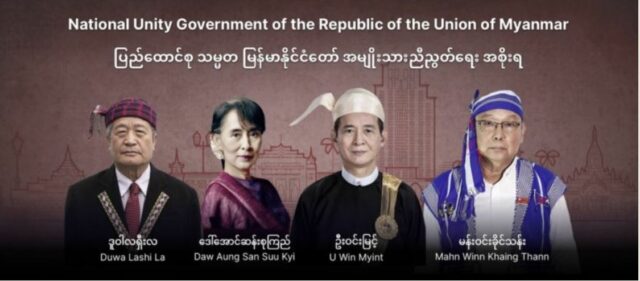Myanmar’s shadow government has outlined basic principles for its defense ministry, putting the men in uniform, their institution and its activities under civilian oversight.
That’s a huge difference from the practices of the current military controlled by the regime.
The 35-point basic principles of the Ministry of Defense were made public by the National Unity Government (NUG) on Friday. The NUG, a parallel government to challenge the legitimacy of the regime’s governing State Administrative Council and its cabinet, was formed by elected lawmakers from the ousted National League for Democracy party (NLD) as well as several representatives from Myanmar’s different ethnic groups in April.
Here are some highlights you may want to know:
Politically, the NUG said, the principles must be in line with democratic norms and human rights as well as key values of federalism such as equality and self-determination.
Leadership Role
- The minister and vice minister of defense must be civilians while the commander-in-chief of the military can only be appointed with the recommendation of the minister. There will be no discrimination on racial and religious grounds. The NUG will lead in the formation of the People’s Security and Defense Council.
The moves are in stark contrast with current practice. Currently, the military chief alone decides who should be the defense minister. And the defense minister is not a civilian.
Enacting And Implementations Of Defense Policies
- When enacting and implementing its policies, the ministry will also be formed with the inclusion of civilians based on their expertise.
- The policies will be drafted based upon public feedback.
Legislative Supervisions
- Defense matters must be under the supervision of civilian rule.
- Defense expenses must be transparent. The parliament has authority to hold hearings and investigations on the issue.
Even under the elected NLD government from 2015 to January 2021, Myanmar’s armed forces were solely controlled by the military chief Senior General Min Aung Hlaing, the current regime leader.
Jurisdiction On Defense Sector
- Any crime committed against civilians must be tried in civilian courts.
- If any defense actions harm civilians, the cases must be adjudicated not only in court martials but also in civilian courts.
Currently, the regime’s military has its own procedures on jurisdiction. Basically, accused service men, even those accused of committing crimes against civilians, have rarely been tried in civilian courts. The military insists that if the accused are the members of the military, they have to be tried by the military as it has its own judicial system.
Appointments
- No discrimination based on gender, race and religion is allowed when it comes to the appointment of service personnel.
Finance And Resource Sharing
- Defense expense must be reviewed by the relevant civilian auditor.
- Defense budget must be requested based on the country’s political and economic development.
So far, the regime has never made public any reports on its expenses, which are only subject to audit by a military auditor
(By arrangement with ‘The Irrawaddy’)
















